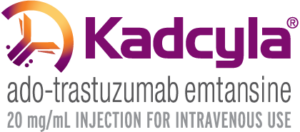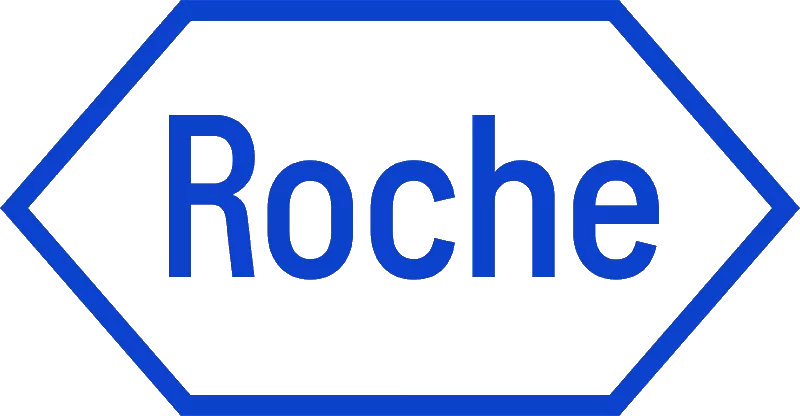
Kadcyla (ado-trastuzumab emtansine) is an antibody-drug conjugate (ADC) designed to deliver potent chemotherapy directly to HER2-positive cancer cells, potentially limiting damage to healthy tissues. Kadcyla combines the HER2-targeting properties of trastuzumab (the active ingredient in Herceptin) with the chemotherapy agent DM1. It is approved for the treatment of patients with HER2-positive metastatic breast cancer who have previously received trastuzumab and a taxane, and for the adjuvant treatment of patients with HER2-positive early breast cancer who have residual invasive disease after neoadjuvant therapy. Kadcyla is developed and marketed by Genentech, a member of the Roche Group.
Breast cancer is a malignant tumor that originates in the cells of the breast, commonly affecting the ducts and lobules. It is the most common cancer among women worldwide, though it can also occur in men. The development of breast cancer involves the abnormal growth of breast cells that can invade surrounding tissues and spread to other parts of the body (metastasize). Risk factors include genetic mutations (such as BRCA1 and BRCA2), family history of breast cancer, hormonal influences, and certain lifestyle factors such as alcohol consumption and obesity.
Early detection through screening methods like mammography, breast self-examinations, and clinical breast exams is crucial for effective treatment and improved survival rates. Treatment options vary based on the stage and subtype of breast cancer and may include surgery, radiation therapy, chemotherapy, hormone therapy, and targeted therapy. Advancements in personalized medicine and ongoing research continue to enhance the understanding and management of breast cancer, leading to more tailored and effective treatment approaches.
Companion diagnostic testing plays a crucial role in the decision to prescribe Kadcyla (ado-trastuzumab emtansine) for the treatment of breast cancer. Kadcyla is specifically designed for patients with HER2-positive breast cancer, a subtype that overexpresses the HER2 protein. To identify patients who are likely to benefit from Kadcyla, an FDA-approved companion diagnostic test is used to confirm the presence of HER2 overexpression or gene amplification in tumor tissue.
These tests, such as the Ventana PATHWAY anti-HER2/neu (4B5) Rabbit Monoclonal Primary Antibody assay and the INFORM HER2 Dual ISH DNA Probe Cocktail assay, are critical for selecting appropriate candidates for Kadcyla therapy. By ensuring that only patients with confirmed HER2-positive status receive Kadcyla, these companion diagnostics help optimize treatment efficacy, reduce unnecessary exposure to the drug’s potential side effects, and improve overall patient outcomes.

Place a test order through your EMR system if enabled or order online by logging in or signing-up for a Foundation Medicine account. Orders can also be submitted via email or fax using our Test Requisition Form.

Order this test through your EHR if you have an interface with Labcorp, via Labcorp Link, or by paper requisition.

This companion diagnostic was developed by an IVD manufacturer as a kit. This is a valid FDA approved test if utilized by 3rd party diagnostic labs who have validated the test using the kit on the specified platform. It is not directly orderable from the manufacturer.

This companion diagnostic was developed by an IVD manufacturer as a kit. This is a valid FDA approved test if utilized by 3rd party diagnostic labs who have validated the test using the kit on the specified platform. It is not directly orderable from the manufacturer.

This companion diagnostic was developed by an IVD manufacturer as a kit. This is a valid FDA approved test if utilized by 3rd party diagnostic labs who have validated the test using the kit on the specified platform. It is not directly orderable from the manufacturer.
Kadcyla (ado-trastuzumab emtansine) is used for the treatment of HER2-positive breast cancer. It is indicated for patients with metastatic breast cancer who have previously received trastuzumab and a taxane, and for the adjuvant treatment of patients with early-stage breast cancer who have residual invasive disease after neoadjuvant therapy that included trastuzumab and taxane-based chemotherapy.
Kadcyla is an antibody-drug conjugate (ADC) that combines the HER2-targeting properties of trastuzumab (Herceptin) with the chemotherapy agent DM1. It is designed to deliver chemotherapy directly to HER2-positive cancer cells, potentially reducing damage to healthy tissues. By targeting HER2-positive cells, Kadcyla can effectively inhibit the growth and spread of these cancer cells.
Patients with breast cancer should undergo companion diagnostic testing to determine if their cancer is HER2-positive. FDA-approved tests, such as the Ventana PATHWAY anti-HER2/neu (4B5) Rabbit Monoclonal Primary Antibody assay and the INFORM HER2 Dual ISH DNA Probe Cocktail assay, are used to confirm HER2 overexpression or gene amplification in tumor tissues, ensuring that only patients with confirmed HER2-positive status receive Kadcyla.
Common side effects of Kadcyla include fatigue, nausea, increased liver enzymes, musculoskeletal pain, bleeding, low platelet count, headache, peripheral neuropathy, and joint pain. It is important to discuss potential side effects with your healthcare provider and to report any unusual symptoms immediately.
Kadcyla is administered as an intravenous infusion. For early-stage breast cancer, it is typically given every three weeks for a total of 14 cycles, unless there is disease recurrence or unacceptable toxicity. For metastatic breast cancer, the treatment schedule may vary based on the patient’s condition and response to therapy.
Patients receiving Kadcyla should use effective birth control during treatment and for seven months after the last dose due to the risk of severe birth defects. They should also inform their healthcare provider of any pre-existing conditions, such as liver or heart problems, and any medications they are taking to avoid potential interactions. Regular monitoring of liver function, heart function, and blood counts is essential to manage and mitigate side effects.

Founded more than 40 years ago, Genentech is a leading biotechnology company that discovers, develops, manufactures and commercializes medicines to treat patients with serious and life-threatening medical conditions. The company, a member of the Roche Group, has headquarters in South San Francisco, California. For additional information about the company, please visit http://www.gene.com.